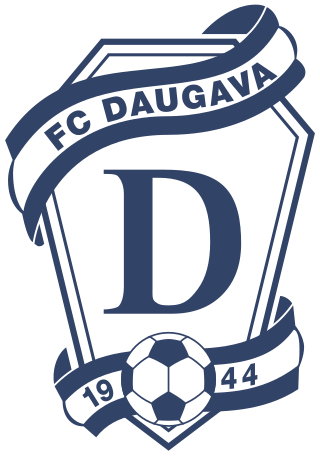Match
Details
RFS | Riga FC |
Assistant referees: | Match rules [1]
|
| |||||||
| Date | 2 March 2024 | ||||||
|---|---|---|---|---|---|---|---|
| Venue | LNK Sporta Parks, Riga | ||||||
The 2024 Latvian Supercup is scheduled to be the third edition of the Latvian Supercup, an annual football match organised by Latvian Football Federation and contested by the reigning champions of the two main Latvian club competitions, the Latvian Higher League and the Latvian Football Cup.
| Team | Qualification | Previous participation (bold indicates winners) |
|---|---|---|
| FK RFS | 2023 Latvian Higher Leagues | None |
| Riga FC | 2023 Latvian Football Cup | None |
RFS | Riga FC |
Assistant referees: | Match rules [1]
|

The Lithuania national football team represents Lithuania in men's international football, and is controlled by the Lithuanian Football Federation, the governing body for football in Lithuania. They played their first match in 1923. In 1940, Lithuania was occupied by the Soviet Union; the country regained its independence in 1990 and played their first match thereafter against Georgia on 27 May of that year.

The Latvia national football team represents Latvia in men's international football, and is controlled by the Latvian Football Federation, the governing body for football in Latvia. They have never qualified for the FIFA World Cup, but did qualify for the European Championship in 2004 under head coach Aleksandrs Starkovs.

The Latvian Football Federation ) is the governing body of football in Latvia with its headquarters located in the capital Rimi Sports Centre in Riga. Its activities include the organizing of the Latvian football championship, the Latvian First League, the Latvian Second League, as well as lower league championships and the Latvian Football Cup. The federation also manages the Latvia national football team and Latvia women's national football team.
The Lithuanian Supercup or LFF Supercup is an annual football match contested between the champions of the previous A Lyga season and the holders of the Lithuanian Football Cup. It is organised by and named after Lithuanian Football Federation and played at the beginning of the season. For sponsorship reasons, it is currently also known as the LFF Optibet Supercup.

FC Daugava was a Latvian football club, based at the Daugava Stadium, in the city of Daugavpils. They lastly played in the Latvian Second League in 2015. They were one of two clubs with the name Daugava and should not be confused with FK Daugava Rīga.
Football is the number one sport based on participation, but the third sport in Latvia after ice hockey and basketball based on popularity. Many other sports are also more popular than football in Latvia, but in recent years it has gained more popularity. The Latvian Football Federation is the sport's national governing body. There is a league system, with the Higher League and First League serving as the top leagues in Latvia. The Latvian Second League is composed mostly of amateur teams.
The Latvia national beach soccer team represents Latvia in international beach soccer competitions and is controlled by the LFF, the governing body for football in Latvia.

The Latvian national futsal team is governed by the Latvian Football Federation, the governing body for futsal in Latvia and represents the country in international futsal competitions, such as the World Cup and the European Championships.

Andrejs Kovaļovs is a Latvian footballer who most recently played for BFC Daugavpils and also represents the Latvia national football team.
The 2011 Latvian Higher League was the 20th season of top-tier football in Latvia. It began on 15 April 2011 and ended on 5 November 2011.
The Lithuanian Women's Supercup was a one-off fixture in Lithuanian football played between the A Lyga champions and the winners of the Lithuanian Women's Cup. In 2005 and 2006 Gintra Universitetas won the league and the cup thus the supercup was played against cup runners-up.
The Latvian Supercup is a one-match annual football competition. The two participating clubs are holders of the Latvian Higher League champions title and the Latvian Football Cup. The fixture is played before the start of the season.
The 2013 Latvian Supercup was the first edition of the Latvian Supercup, an annual football match organised by Latvian Football Federation and contested by the reigning champions of the two main Latvian club competitions, the Latvian Higher League and the Latvian Football Cup. It was played at the Celtnieks Stadium in Daugavpils on 9 March 2013, between the 2012 Latvian Higher League winners Daugava and the 2011–12 Latvian Football Cup winners Skonto.
Valērijs Šabala is a Latvian professional footballer who plays as a forward for II liga club Chojniczanka Chojnice.

Vladislavs Gabovs is Latvian football right-back who plays for Salaspils and the Latvia national football team.
The 2014 Latvian Supercup was scheduled to be the second edition of the Latvian Supercup, an annual football match organised by Latvian Football Federation and contested by the reigning champions of the two main Latvian club competitions, the Latvian Higher League and the Latvian Football Cup. It was intended to be played on 8 March 2014, between the 2013 Latvian Higher League and 2012–13 Latvian Football Cup winners Ventspils and the 2013 Latvian Higher League runner-up Skonto. The match was rescheduled to an unknown date.
The 2016 Latvian Higher League was the 25th season of top-tier football in Latvia. FK Liepāja were the defending champions. The season began on 11 March 2016 and ended on 5 November 2016; the relegation play-offs took place on 9 and 13 November 2016.

Valdas Dambrauskas is a Lithuanian professional football manager. He will be the manager of Cypriot First Division club Omonia from the start of the 2024–25 season.

Andrejs Cigaņiks is a Latvian professional footballer who plays as a left winger or wing-back for Polish club Widzew Łódź and the Latvia national team.

Karlīna Miksone is a Latvian footballer who plays as a midfielder and has appeared for the Latvia women's national team.